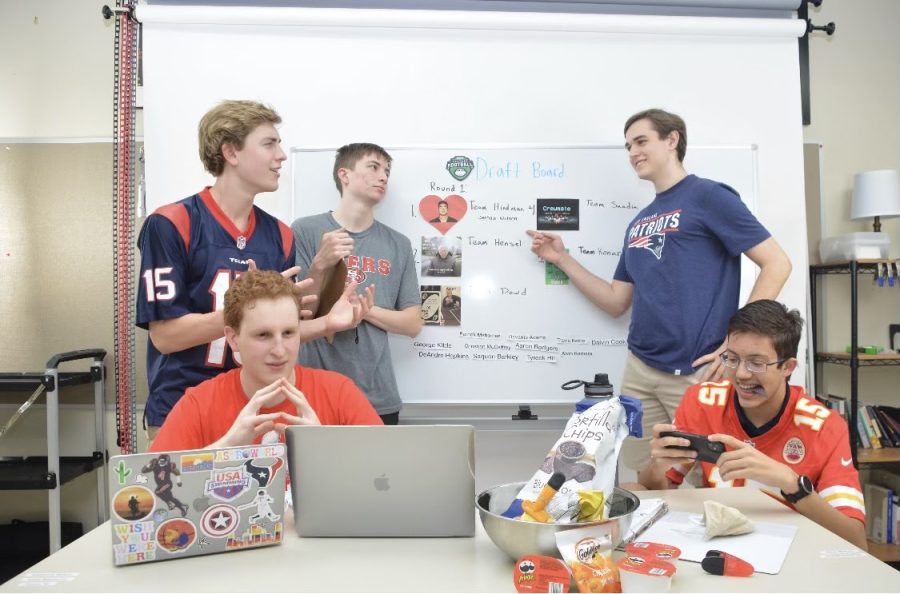Students, faculty compete in fantasy football leagues
Ethan Saadia, Matthew Hensel, Aiden Dowd, David Hindman and Alex Konar (all ’21) have continued to play in the same fantasy football league.
On Jan. 9, Las Vegas Raiders kicker Daniel Carlson scored a game-winning field goal to send his team to the playoffs. Although the Super Bowl does not arrive for another month, the kick concluded the season for millions of fantasy football players.
In fantasy football, players draft a team of NFL players and compete against friends who have done the same. Throughout the season, they manage their team and assemble lineups to achieve the highest statistical output. At the end of the season, they participate in playoffs, culminating in a league championship.
Senior Stefan Gustafson, a captain of the St. John’s football team, participates in a fantasy football league with teammates.
“I’ve found that playing football in real life has given me a little bit more context on how to play the virtual version,” Gustafson said.
David Hindman (’21) has continued to play in the fantasy football league he formed with his SJS friends even after graduating. Hindman did not know a lot about football before joining the league, but he has since learned the intricacies of the game.
“My friends and I still use the same group chat,” Hindman said. “This has definitely kept us connected.”
Gustafson looks forward to talking about fantasy football with his friends each day. Whenever conversation lags at the lunch table, a mere mention of fantasy football electrifies the mood.
“Our discussions about the weekly decisions got very intense,” Gustafson said, “but in the end, it’s all in good fun. It really brought my friends closer together.”
College counselor Jeremy Johnson has played fantasy football with college friends for the past 10 years. He enjoys the social camaraderie that accompanies the activity but feels conflicted when a player on his fantasy team faces his hometown team, the Buffalo Bills.
“I want my [Bills] to win, but I also want my fantasy player to get a lot of points,” Johnson said. “That way, both my fantasy team and home team have a successful game.”
Sophomore Charlie Baksht was one of the top scorers in his 2021-22 league with St. John’s peers. He says that his weekly research into different statistics helped him choose a strong roster of players.
“I use different indexes to project people’s situation and their potential,” Baksht said. “For skill players like wide receivers and running backs, you can also look at their quarterback rating and their offensive line rankings.”
Baksht acknowledges that his weekly roster selections are somewhat akin to a roll of the dice despite all of his research.
“Knowing that the performance of your fantasy team is up-in-the-air automatically takes off the edge and allows it to just remain fun,” Baksht said.
Designating a punishment for the manager of each league’s losing team is a popular way of keeping the competitive edge in the activity.
“Consequences for coming in last can add a fun element, as long as they are not too extreme,” Johnson said. “In most leagues, they are embarrassing tasks that the loser has to do.”
When deciding punishments, players often borrow from popular social media challenges, such as the “24 Hour Waffle House Challenge” and the “Head-Shaving Challenge.”
Other leagues take inspiration from SJS traditions. Hindman’s league, composed of cross country athletes, decided to make the loser run the team’s annual Milk Mile.
“Punishments keep people honest and on their toes,” Gustafson said.
Gustafon intends to keep playing in the same league when he graduates this spring.
“My friends have chatted about how we will all live in different places in our college lives and beyond,” Gustafson said. “I hope fantasy football will keep us connected for years to come.”

Arjun Maitra ('24) joined The Review in 2020 as a freshman. His favorite team is the Baltimore Ravens and enjoys a taco anytime, especially during NFL...












